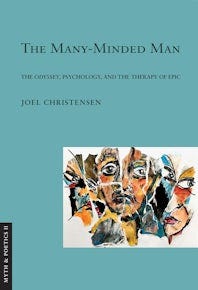This post is a continuation of my substack on the Iliad. All proceeds from the substack are donated to classics adjacent non-profits on a monthly basis. This post is a diversion from the Iliad, but not one that is unrelated to the Iliad
Anachronism can be a major obstacle for engaging with ancient texts. Often readers will object to certain interpretations of Homer because the frameworks applied center values or ideas that are more at home to our contemporary concerns than what we can say with certainty about epic and its audiences. While reader response approaches can countermand such complaints, there are some claims that can be a little more challenging to answer.
This is especially the case when it comes to modern interests in emotion, affect, and psychology. As some of my recent posts have emphasized, there is a bit of a sketchy history when it comes to continuities in human expression and experiences over time. (Most grievous is the insistence on a particular type of progressive movement from unintegrated selves to a modern 'whole and complicated person). My stance has long been that human minds (and bodies) have not changed since the time of Homeric audiences—the primary change is how people talk and understand the way their minds and bodies work (and in connection with each other). Even in the same century, from one culture to another, the way we communicate and characterize minds, bodies and communities can change radically and can have a resulting impact on the way people think about minds, bodies, and groups.
I have talked about this some in my post about Historical Psychology, but in recent comment on scholarship I noted that some times people talk about ideas of agency and selfhood in one epic without thinking about the other. My basic view is that the epics are complementary in their construction of how a human mind works (and doesn’t) in the world. Almost everything I write about the Iliad is now influenced by my thoughts about how the poem anticipates and shapes audience responses and how these responses are based on implicit models of cognition, narrative, and emotion. From the epic’s first conflict to its final, albeit brief resolution, the Iliad is invested in testing ways of thinking about thinking, of how stories shape thought and action, and how understanding the way people' ‘work’ can change the way we treat one another. Indeed, if my time on this earth is long enough, I hope to write a book about how the Iliad itself offers a model of humanization through narrative and recognition.
But that’s about the future: this post is in part about what takes us there. I am teaching a course called “The Homeric Odyssey and the Human Mind” (virtually) for Roundtable at the 92nd Y starting on October 17th. It will be three sessions. Here’s the description from Roundtable:
This three-part course on Homer’s Odyssey builds on the ancient tradition of reading Homeric epics, but with a twist. Instead of focusing merely on the narrative, you’ll be guided through this complex ancient Greek poem with an emphasis on how modern psychological concepts are reflected in its “theory of mind” — and on how Homeric narrative positions storytelling both as a therapeutic treatment for and a potential cause of maladies of the mind. Your expert guide will be Joel Christensen, Professor of Classical and Mediterranean Studies at Brandeis University. In addition to articles and books on early Greek poetry and myth, he is the author of The Many-Minded Man: the Odyssey, Psychology, and the Therapy of Epic.
By drawing on modern cognitive science and clinical psychology, Christensen will help you see The Odyssey the way ancient readers did — as allegory or metaphor, and as a narrative that offers insight into the nature of the universe, the character of the gods, and the fundamental challenges of the human condition.
The story of Odysseus’ wanderings after the fall of Troy has long enchanted audiences with its themes of journey and homecoming, and is especially attractive to modern readers interested in its exploration of identity and what it means to be a person. Join us to discover how the plot of The Odyssey also creates a framework for thinking about human decision-making and the relationship between individuals and their communities. Professor Christensen would like to use Emily Wilson's acclaimed translation of The Odyssey.
This material for this course emerges from my 2020 book The Many-Minded Man: The “Odyssey”, Psychology, and the Therapy of Epic. I’ll be adding new material and encouraging conversation about it. I am especially interested in feedback on expanding some of the approaches beyond some of my primary emphasis on learned helplessness, Narrative therapy, and group psychology.
As a one-time resident of NYC, I know the 92nd Y is a legendary community venue, so it was easy for me to say yes when they invited me to share work from the Odyssey. Don’t hesitate to reach out if you have any questions about this course or its contents. Registration for the course is open now.
Here’s the information again: Link to the course description





